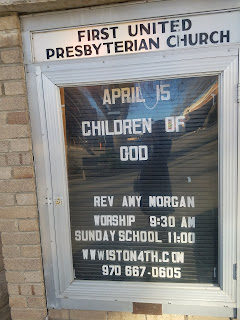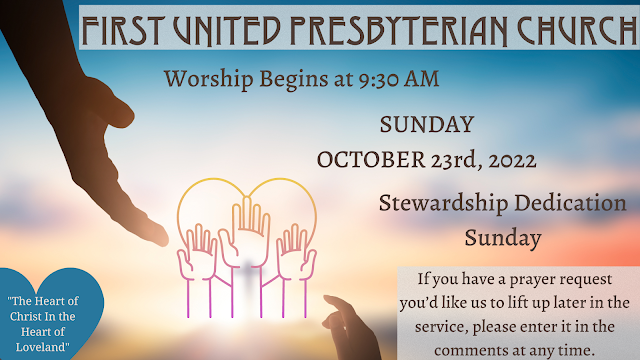Children of God
First United Presbyterian Church
“Children of God”
Rev. Amy Morgan
April 15, 2018
Psalm 4
Answer me when I call, O God of my right! You gave me room when I was in distress. Be gracious to me, and hear my prayer.
2 How long, you people, shall my honor suffer shame? How long will you love vain words, and seek after lies? Selah
3 But know that the LORD has set apart the faithful for himself; the LORD hears when I call to him.
4 When you are disturbed, do not sin; ponder it on your beds, and be silent. Selah
5 Offer right sacrifices, and put your trust in the LORD.
6 There are many who say, "O that we might see some good! Let the light of your face shine on us, O LORD!"
7 You have put gladness in my heart more than when their grain and wine abound.
8 I will both lie down and sleep in peace; for you alone, O LORD, make me lie down in safety.
1 John 3:1-7
See what love the Father has given us, that we should be called children of God; and that is what we are. The reason the world does not know us is that it did not know him.
2 Beloved, we are God's children now; what we will be has not yet been revealed. What we do know is this: when he is revealed, we will be like him, for we will see him as he is.
3 And all who have this hope in him purify themselves, just as he is pure.
4 Everyone who commits sin is guilty of lawlessness; sin is lawlessness.
5 You know that he was revealed to take away sins, and in him there is no sin.
6 No one who abides in him sins; no one who sins has either seen him or known him.
7 Little children, let no one deceive you. Everyone who does what is right is righteous, just as he is righteous.
“The most sacred thing I do is care, and provide for my workers, my family.” So says Michael Scott, the branch manager on the TV show, “The Office.” Scott defines his role in this “family” as a father to his children, providing money, food…not directly but through the money. Healing them by choosing a new medical plan.
Like any family, the family of “The Office” has plenty of disfunction. Personality clashes and power grabs, pranks and general misbehavior abound in “The Office.” But what made this show work so well for eight seasons is the sense that each member of the staff belonged to one another and to something larger. Not a company. Not a brand. A family. A wacky, messed-up, hilarious family.
I really hate to say this, but the family of God is not so different from that of “The Office.” The first letter of John assures us that we are children of God. We are all part of God’s family. This is wonderful and affirming. This is great news. Until we hear what the family of God looks like.
The family of God is wacky and weird. The world doesn’t understand us. The family of God is goofy. We don’t really know where we’re going or what we’re doing, but we’re pretty sure we’ll know we’re in the right place when we get there. In the meantime, we should try to behave, but we probably won’t do a very good job. This, according to John’s letter, is the family of God, the strange, messy children of God.
And that is actually really good news. John says that what we will be has not yet been revealed. Who knows how we’ll turn out, if we’ll ever get our act together. But, “Beloved, we are God’s children now.”
Not when we’ve earned enough Brownie points or stars in our crown. Not when we can sing like an angel or articulate a systematic theology. Not when we’ve sold everything we have, given to the poor, and followed Jesus perfectly. “We are God’s children now; what we will be has not yet been revealed.”
And isn’t that just the way with all children? A child is born, and they more or less all look the same. Some are bald and some have a load of hair, but they all pretty much resemble a 95-year-old man in some sense. They all speak the same language: crying. They all eat the same thing. They all make the same mess. We all come into this world appearing to the senses to be fairly similar.
Which gives our parents no clue whatsoever as to how we’ll turn out in the end. Parents spend countless hours wondering: how tall will my child be? will they be kind? will they be courageous? will they make enough money to support me in my old age?
These questions have vexed parents for generations as they stare at these miniature old men and listen to them howl.
But even as these questions go unanswered in the early days of a newborn’s life, there is one question that has already been answered with absolute certainty. To whom does this child belong? In this country, at least, there’s a legal document binding the parent to the child. A birth certificate establishing this familial relationship. And apart from this legally binding document, most parents claim their child, know their child, love their child, long before they can determine if this investment is going to pay off in the end.
And that is how God loves us. We are children of God, in all our sameness and all our diversity; in all our need and with all our mess. This relationship is established in our baptism certificate, binding us to God and to all of God’s family. But even apart from this document, God has claimed us, knows us, loves us, long before we’ve shown any capacity to make God’s investment in us worthwhile.
A couple I knew back in Michigan fostered a spunky, affectionate 7-year-old girl. They decided after a short time that they’d like to adopt her. It was almost two years before the adoption became complete, before they had that legal document binding parents to child. But she was their child from the beginning. It might have taken a while for the courts to catch up with reality. But she was and is their child, now and always. She is as precocious as they come. There’s no telling how she’ll turn out in the end. But those parents claimed her and love her dearly, even before they knew if they could be a forever family.
While there’s guarantee that our children will turn out the way we hope, the first letter of John assures us that God’s parental investment will pay off. We will grow up to resemble our divine Parent, for, when he is revealed, we will be like him, for we will see him as he is. Even if we have been estranged from God for a long while; even if we couldn’t pick God out of a lineup right now; we will recognize God when and where God shows up because the face of God will be as familiar to us as the face in the mirror.
As days go by, and we long to see that face, recognize God in the world and in our lives, even the dim hope of that possibility inspires us to live in a way that the world around us doesn’t quite understand. We love our enemies instead of hating them. We beat swords into plowshares. We show up here on Sunday mornings to sing and pray and speak in unison to a God so mysterious that half the time we can only describe this God in vague outlines or confusing human attributes.
But no matter how great our hope, how deep our love, how blessed our assurance, we don’t always follow the rules of God’s household. Like any good parent, God made some rules for humanity to live by. Like all children, especially in their teenage years, we often think God’s rules are arbitrary, unfair, and oppressive. Many folks find God to be too strict and demanding. And for this very reason, many folks move out of God’s house as soon as possible.
But that doesn’t mean they aren’t still God’s children. Just because our kids make their own way in the world and abandon everything we taught them doesn’t mean they aren’t still our children. They’re our children, even when they are reckless and foolish and, as this letter calls it, lawless. Sin is lawlessness.
And for some of us, it takes a long time to come around to following the laws, the rules, of God’s family. We fight it tooth and nail. I’m not talking about the Torah, the Jewish Law, God’s rules ordering the life of Israel for their blessing and well-being. I’m talking about the law, the rule, from which all those rules flowed. The law of loving God and neighbor. The law to love one another as Christ loves us.
This law is what binds us together as children of God. From that law flow the laws to honor your parents, to not steal your sister’s clothes, to not lie about who broke the lamp, to not neglect your family by working 7 days a week. From that law of love flows the law to not say, “But it isn’t fair that my brother gets to sleep in the tent! I want to sleep in a tent, too!” Yes, that’s a law. I promise. It’s one of the Ten Commandments.
Even when we’re grown, God knows how we will ultimately turn out. God knows if we will ever abide with God, be righteous by doing what is right. We spend an awful lot of time not seeing or knowing God because we are going right along, doing as we please, and daring God to do something to stop us. Our relationship with sin is like a kid in the back seat of the car with her sibling, going, “I’m not touching you! I’m not touching you!” We look for every loophole, every interpretation, every exemption clause that will allow us to pretend that we’re following the rules in God’s family when we’re so clearly not.
And still, “Beloved, we are children of God now.”
Whether or not we possess some official documentation, we are children of God now. Whether or not we follow the rules or do our best to break them, we are children of God now.
Our family may be dysfunctional, awkward, and strange. We may misbehave, offend each other, and have occasional clashes. Sin and lawlessness may abound from time to time. But we are children of God now, we belong to the family of God, and we know that [God] was revealed [in Jesus Christ] to take away sins, and in him there is no sin.
In some strange and mysterious way, in belonging to each other and to God, our odd and messy family becomes something like Jesus, something like sinless, something like righteous. Not because we are perfect or pure. But because the one who calls us children loves us, and that love transforms us.
Maybe so slowly that the change is almost imperceptible. But abiding with God, living in the household of God’s family, getting to know each other and God on the most intimate level – helps us learn to follow God’s law of love. That helps us recognize the face of God and helps us see God’s features in our own.
For all the many mistakes manager Michael Scott makes on “The Office,” he may have gotten at least one thing right. The most sacred thing we do is care for our family. Amen.




Comments
Post a Comment